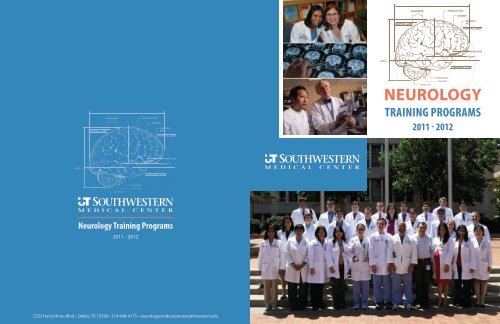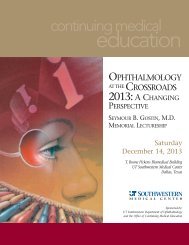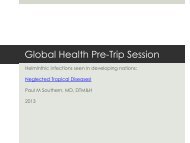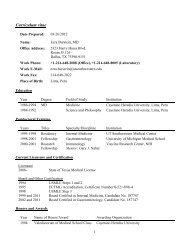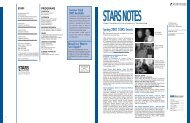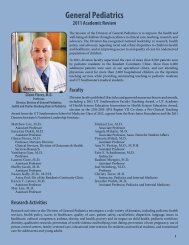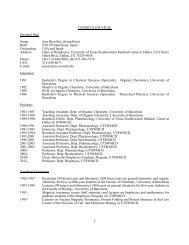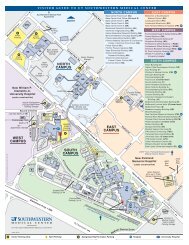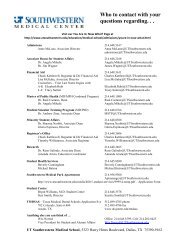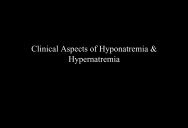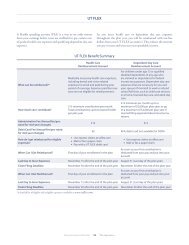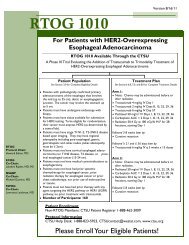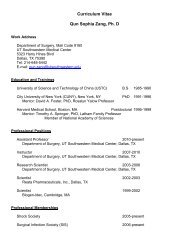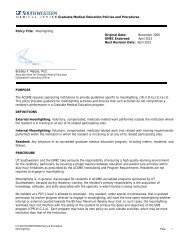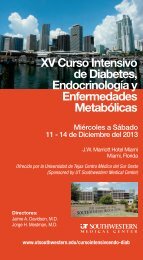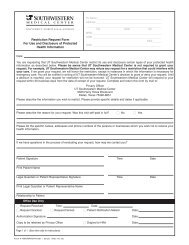Neurology Training Programs - UT Southwestern
Neurology Training Programs - UT Southwestern
Neurology Training Programs - UT Southwestern
You also want an ePaper? Increase the reach of your titles
YUMPU automatically turns print PDFs into web optimized ePapers that Google loves.
NEUROLOGYTRAINING PROGRAMS2011 - 2012<strong>Neurology</strong> <strong>Training</strong> <strong>Programs</strong>2011 - 2012
2Welcome to <strong>UT</strong> <strong>Southwestern</strong> <strong>Neurology</strong>NEUROLOGY TRAINING PROGRAMSWe are excited to share some information about post-graduate training opportunitiesin the Department of <strong>Neurology</strong> and Neurotherapeutics. <strong>UT</strong> <strong>Southwestern</strong> MedicalCenter at Dallas is a leader in patient care, biomedical research, and medical education. We offera wide variety of exciting training opportunities for residents and fellows.Our categorical 4-year residency program in adult neurology is accredited by the ACGME andrecognized by the American Board of Psychiatry and <strong>Neurology</strong>. The division of child neurologyoffers a fully-accredited 3-year program in child neurology and a combined 5-year program in pediatricsand pediatric neurology based at Children’s Medical Center of Dallas.Table of ContentsWe provide the highest quality training in general neurology, neurotherapeutics, and the majorneurological subspecialties. Trainees receive extensive clinical experience in the inpatient and outpatientsetting supervised by an active, energetic faculty with a wide range of clinical and researchinterests. Teaching conferences and electives supplement the basic curriculum and provide residentswith a strong foundation in neuroscience and evidence-based neurology.3 Welcome to <strong>UT</strong> <strong>Southwestern</strong> <strong>Neurology</strong>4 Campus and Facilities6 Dallas - Fort Worth Metroplex8 Adult <strong>Neurology</strong> Four-Year Program10 Child <strong>Neurology</strong> Program11 <strong>UT</strong> <strong>Southwestern</strong> by the Numbers12 Fellowships14 Teaching Conferences14 Residency Program Tracks15 Mobile Curriculum16 <strong>Neurology</strong> Faculty17 Current Residents and Fellows19 Campus MapFor more informationwww.utsouthwestern.edu/neurologyresidencywww.utsouthwestern.edu/patientcareneurologyresidency@utsouthwestern.eduAs directors of the neurology training programs, we maintain an absolute commitment to qualityand integrity while encouraging innovation and flexibility. We aim to keep <strong>UT</strong> <strong>Southwestern</strong> atthe forefront of neurology education and continue to train the future leaders in neurology.Steven Vernino MD PhD Rana Said MDMark Goldberg MD<strong>Neurology</strong> ResidencyChild <strong>Neurology</strong> ResidencyChairProgram DirectorProgram DirectorDepartment of <strong>Neurology</strong>NEUROLOGY TRAINING PROGRAMS3
Parkland and University Hospitals are both JCAHO-certified primary stroke centers. US News and4Campus and FacilitiesWorld Report ranked <strong>UT</strong> <strong>Southwestern</strong> University hospitals in the top 30 for six specialties includingneurology and neurosurgery. Children’s Medical Center was ranked for eight specialties including pedi-NEUROLOGY TRAINING PROGRAMSThe University of Texas <strong>Southwestern</strong> Medical Center at Dallas campus is located a few minutesnorth of downtown Dallas and includes <strong>UT</strong> <strong>Southwestern</strong> Medical School, GraduateSchool of Biomedical Sciences, <strong>UT</strong> <strong>Southwestern</strong> School of Health Professions, four hospitals, numerousoutpatient clinics and a large research complex. In addition to dedicated teaching and pioneeringresearch, our neurologists provide outstanding care to patients from Texas and neighboring states.<strong>UT</strong> <strong>Southwestern</strong> is the major tertiary referral center for neurological disorders in the region and theonly neurology residency program in North Texas.atric neurology.The Dallas Veterans Affairs Medical Center(VAMC) is a 289-bed hospital located south of downtownDallas. The Dallas VAMC serves a 30-countyarea with approximately 430,000 veterans. In additionto the hospital, the VAMC includes a 30-bedspinal cord injury unit and long-term care facilities.Residents provide inpatient neurology consultationTexas Scottish Rite Hospital for Children (TSRH),located one mile south of <strong>UT</strong> <strong>Southwestern</strong>, is recognizedinternationally for clinical care and researchin chronic neurological and orthopedic disorders.<strong>Neurology</strong> residents rotate at TSRH for a uniqueexperience with rare chronic neurological problems.Each year, the Carell-Krusen neuromuscular sympo-and outpatient clinics for spinal cord injury, MS, epi-sium provides a forum for residents to present and tolepsy, sleep disorders and general neurology.learn from national experts.Parkland Memorial Hospital is the primaryZale-Lipshy University Hospitalteaching facility at the medical center. This 968-is a 144-bed tertiary referral teachingbed, public, tax-supported hospital has earneda national reputation not only for patient carebut also for medical education and training.<strong>Neurology</strong> services are located on the 8 th floor ofthe hospital with a dedicated neurology-focusednursing staff. Every neurology resident conductsa weekly outpatient clinic at Parkland.hospital focused on the neurosciences(neurology, neurosurgery, psychiatryand physical medicine). Patientsbenefit from the latest advances inneurovascular surgery, interventionalneuroradiology, and neurological intensive care.St. Paul University Hospital is a 271-bedteaching hospital focused onmedical and surgical subspecialtieswith outstanding programs in solidResidents rotate in several outpatient settings including the James W. Aston Ambulatory Care Centerand child neurology clinics at Children’s Medical Center. The neuromuscular disorders section includesMDA-supported multidisciplinary specialty clinics forALS, muscular dystrophy and myasthenia gravis. Clinicsfor multiple sclerosis, sleep disorders, and movementdisorders provide neurology residents with additionalspecialized training. The Harold C. Simmons comprehensivecancer center at <strong>UT</strong> <strong>Southwestern</strong> is the onlyNCI-designated center in North Texas and includes amultidisciplinary neuro-oncology clinic.organ transplantation (heart, lung,kidney and pancreas) and heartfailure. <strong>Neurology</strong> residents provideinpatient consultations.Children’s Medical Center of Dallas (CMC)includes a 500-bed hospital andnumerous outpatient clinics forchildren from birth through age 18.CMC, one of the top ten children’shospitals nationwide, is home topediatric neurology.Neurophysiology services (EEG, EMG, autonomic,sleep, and intraoperative monitoring studies) and neurosonologyare provided by the neurology departmentfor the entire <strong>UT</strong> <strong>Southwestern</strong> medical center campus.Full neurodiagnostic imaging support including MRI, CT, angiography, myelography, SPECT and PETis available at all the clinical centers. Several specialized MR scanners (including high field 7T and MRtensor imaging) are available for research applications.<strong>UT</strong> <strong>Southwestern</strong> maintains close affiliations with several other affiliated hospitals in Dallas and FortWorth, including the Institute for Exercise and Environmental Medicine (an international research centerfor exercise physiology and metabolic muscle disorders). The <strong>Neurology</strong> and Neurotherapeutics Departmentalso coordinates the neurology residency training program based at Seton hospitals in Austin, Texas.NEUROLOGY TRAINING PROGRAMS5
6Dallas - Fort Worth Metroplex7NEUROLOGY TRAINING PROGRAMSDallas is many things — an affordable place to live,a convenient place to learn, and a great place tohave fun. An extensive highway network and a growinglight rail system (DART) lead to the medical center, makingit easily accessible to a number of suburban areas. TwoLifestyle. The Dallas area abounds with parks, tennis courts, golf courses, jogging and cyclingtrails, and lakes for water sports and sailing. The area is home to two world class zoosand a large amusement park complex. Fans of professional sports can follow America’sfootball team, the Dallas Cowboys, the American League baseball champion Texas Rangers,and the World basketball Champion Dallas Mavericks, Stars hockey, and FC DallasNEUROLOGY TRAINING PROGRAMSconvenient airports provide easy connections throughoutMLS soccer. Cowboys stadium in Arlington is the home to many events including thethe USA and the world.2011 SuperBowl.The DFW metroplex is noted for numerous museumsand galleries including the Dallas Museum of Art, Nasher© Derek EvattWhether you are married with children or single with a pet, Dallas has an area of townthat will suit your needs. Within two miles of the medical center is Uptown Dallas, featur-Sculpture Center and the Kimbell Art Gallery. World-classing apartments and condominiums occupied by the city’s manyperforming arts can be found at the Meyerson Symphonyyoung professionals. Uptown boasts outstanding restaurantsCenter, Bass Performance Hall, Music Hall, and Winspearwith patios, shops, parks and bustling nightlife. Some train-Opera House. More casual entertainment venues includeees prefer to purchase affordable homes outside the main urbanVictory Park, American Airlines Center, the historic WestEnd, and an eclectic music scene in Deep Ellum.© Derek Evattarea in nearby suburbs including Irving, Las Colinas, Coppell,Plano, Carrollton or Lewisville. These are excellent areas to raisea family with outstanding public education and safe environments.Best of all, these communities are within 20 minutes of<strong>UT</strong> <strong>Southwestern</strong>. If commuting is not your thing, a number ofnice apartment complexes have grown up just across the streetBIG Dfrom the medical center. Dallas is a city built to meet your needs!© Derek Evatt
8NEUROLOGY TRAINING PROGRAMSAdult <strong>Neurology</strong> Four-Year Program1 2 3 4First Year (Internship) Second Year Third Year Fourth YearResidents spend their first year as an integratedThe focus of the PGY2 year is direct carePGY3 residents have a more diverse PGY4 residents supervise the neurology inpatientmember of the <strong>UT</strong> <strong>Southwestern</strong> internalmedicine residency program. The PGY1 year includesof hospitalized patients with neurologic disease.Residents spend approximately eight months onexperience including three months with childneurology at Children’s Medical Center and Texas or consult services at the affiliated hospitalsfor half the year. The senior resident on service fillsnine months of internal medicine services the neurology inpatientScottish Rite hospitals. Subspecialty rotations a major teaching and organizational role and is es-(general medicine, cardiology, and intensive care),one month of elective and one month of emergencymedicine. The internal medicine program is outstanding,and residents quickly gain a firm foundationin general internal medicine and acute care.The PGY1 residents have a weekly continuity clinicin the department of neurology.The final month of the PGY-1 year is a dedicated“Introduction to <strong>Neurology</strong>”. This unique experienceis devoted to education without major clinicalresponsibilities. Residents receive focused instructionin basic neuroscience, neuroradiology, andcommon neurological procedures as well as handsondemonstration and practice of the neurologicalexamination. The remainder of the month consistsof clinical rotations in subspecialty and general outpatientneurology with one-on-one interaction withfaculty and senior neurology residents.and consult services at theteaching hospitals. Duringthese rotations, residentsdevelop diagnostic skillsand become familiar withmanagement of acute neurologicissues under the supervision of senior residentsand attending faculty. The year is rounded outwith rotations in the neurocritical care service, epilepsymonitoring unit and neuropathology.Outpatient training continues with weekly neurologycontinuity clinics where residents follow patientswith a wide variety of disorders throughoutthe entire four years of training. This longitudinalperspective on disease patterns and managementbenefits both the house staff and patients.with neuromuscular, movement disorders, andelectroencephalography are scheduled, and electiverotations are available in a host of other areas. PGY3residents also participate in consultation services forpsychiatry and inpatient neurology.ElectivesResidents may choose from a wide variety of clinicaland research electives. Some electives are essentialto the training of a well-rounded neurologist such asmultiple sclerosis, sleep medicine, and neuroradiology.Other electives may be coordinated exclusivelyto meet the career goals or interests of one resident.Popular and unique electives at <strong>UT</strong> <strong>Southwestern</strong>include neurosonology, neuro-oncology, neuroophthalmology,and neuro-otology.sential to the education of medical students, interns,rotating residents from other programs, and juniorneurology residents.The remainder of the year is reserved for electives.Elective time is designed to be flexible to meet theindividual needs of residents as they embark on academicor private practice careers. Residents withacademic interests may devote any amount of theirelective time to a clinical or basic science projectunder the supervision of a member of the medicalcenter faculty.NEUROLOGY TRAINING PROGRAMS9
10NEUROLOGY TRAINING PROGRAMSChild <strong>Neurology</strong> <strong>Programs</strong>After completing two years of pediatric residency trainingat an accredited program, the pediatric neurology residententers the three-year ACGME-accredited Child <strong>Neurology</strong>Residency Program. The first year consists of about nine monthsof adult neurology at our affiliated adult neurology institutions(similar to the adult neurology resident PGY2 year) and threemonths of pediatric neurology services at Children’s MedicalCenter. The second and third year of the program comprise 12-15 months of pediatric neurology service, three months of subspecialty rotations with adult neurologyfaculty, and the remainder of the time in approved neurology electives. These electives providesufficient flexibility as to be tailored to each resident’s particular interests, including clinical or basicneuroscience research.Teaching ConferencesDaily attending rounds are conducted on all the hospitalteaching services. A comprehensive neurology didacticlecture series presented 3 times per week covers the breadthof clinical neurology and related topics. Grand Rounds, held atnoon every Wednesday, features visiting lecturers or local presenters.All residents present a clinical pathological conference and anindependent research presentation. Every Friday, residents meetfor lunch at Unwin conference and then attend Rosenberg rounds(a time to challenge the senior neurology professors with toughcases). Numerous other journal clubs, subspecialty and researchconferences are available to residents throughout the week.The Neurodevelopmental Disorders (NDD) residency under the direction of Dr. Patricia Evans is anindependent 4-year ACGME- accredited program. The NDD resident follows a similar curriculumas core child neurology but focuses on the evaluation and management of children with neurogeneticsyndromes or developmental disorders, such as autism.Our exceptional Child <strong>Neurology</strong> faculty includes specialists in pediatric epilepsy and clinical neurophysiology,neurobehavioral neurology, neurometabolism and neurogenetics, pediatric stroke, neonatalneurology, neuromuscular disorders, and pediatric headache.Residency Program TracksOur program endorses flexible residency training and offers up to six months of time duringthe PGY3 and PGY4 years for electives and/or research endeavors. Residents may elect tofollow a training pathway (track) according to their career goals.The child neurology match is currently through the National Residency Match Program (NRMP).This is for a 3-year child neurology residency. Joint interviews are set up with the Pediatrics residencyat <strong>UT</strong>SW for highly competitive applicants. Applicants interested in completing the two requiredpreliminary years of pediatrics residency training at <strong>UT</strong>SW must also submit an application to thepediatric residency program through ERAS and the NRMP.For residents with basic science research interests, a research track schedule allows 6-9 months of basicor clinical research during residency. The goal of the research track is to position the resident to entera clinician-scientist career after graduation and to compete successfully for early career developmentgrants (such as K awards from NIH).A vascular/hospitalist track, for residents interested in acute care neurology, includes additional rotationsin neurocritical care, inpatient consultation, neurosonology, neuroradiology, neurosurgery andneurointerventional experiences.Residents with a goal of community-based private practice can follow a training track that includesan emphasis on a varied outpatient experience (including rotations with neurology faculty in communitypractice in Dallas and Austin).NEUROLOGY TRAINING PROGRAMS11
12NEUROLOGY TRAINING PROGRAMSFellowshipsNearly all of our graduating residents decide to pursue additional training, and our graduatesare highly successful in obtaining competitive fellowships at <strong>UT</strong> <strong>Southwestern</strong> and elsewhere.<strong>UT</strong> <strong>Southwestern</strong> offers fellowship training in many clinical subspecialties. Laboratory-basedresearch fellowships are available for those pursuing clinician-scientist careers.Clinical Neurophysiology. One-year ACGME-accredited program with training in neurophysiology(EEG/EMG) and clinical training in epilepsy and neuromuscular disorders. Additional exposureto evoked potentials, intra-operative monitoring, Botox, autonomic testing and sleep studies isalso provided. Up to five fellowship positions are available each year. <strong>Training</strong> can be focused on eitherpediatric or adult clinical neurophysiology.Epilepsy-EEG Fellowship. This program offers specialized training in epilepsy, electroencephalography,and sleep. <strong>Training</strong> takes place in epilepsy clinics and in the active epilepsy monitoring units(EMU) at Parkland and Children’s hospitals. Invasive EEG, SPECT, MR spectroscopy, and intraoperativemapping are routinely used in patient evaluations.Movement Disorders Fellowship. The one-year movement disorders fellowship provides trainingin clinical patient care and research in movement disorders. Fellows become proficient in comprehensivemanagement including chemodenervation and deep brain stimulation.Neuro-Critical Care Fellowship. The two-year UCNS-accredited fellowship accepts two fellowseach year. Parkland Hospital’s level 1 trauma center and Neurocritical Care Unit offer a rich experiencein neurotrauma and acute stroke management. The neuro ICU at Zale-Lipshy University hospitalmanages patients with complex vascular, oncological and immunological disorders.Neuro-Oncology Fellowship. One-year fellowship focused on the medical and surgicalmanagement of tumors of the nervous system. Clinical and bench research are integrated into thefellowship year.Pediatric Neuromuscular Fellowship. The year focuses on clinical evaluation and managementof children with neuromuscular disease, including outpatient clinics, electrodiagnostic studies, andneuropathological sessions each week. Clinics are multi-disciplinary so the trainee gains experience inmanaging and treating the complications of muscle weakness, such as restrictive lung disease, malnutrition,and mobility needs.Neuroimmunology/Multiple Sclerosis Fellowship. This one year fellowship provides intensivetraining on the multidisciplinary management of MS and related disorders, with exposure to neuroradiology,neurourology, neuro-ophthalmology, basic neuroimmunology, and management of depression,chronic fatigue, and pain. Fellows regularly participate in clinical research and teaching activities.Neuromuscular Medicine Fellowship. The one-year ACGME-accredited program focuses onclinical, electrophysiological, and histological evaluation of neuromuscular disorders. Fellows attendthe ALS, myasthenia, MDA, and peripheral neuropathy clinics as well as daily EMG/NCS sessions.There is ample opportunity for research projects. Up to two fellows each year.Sleep Medicine Fellowship. One-year fellowship on polysomnography and management of sleepdisorders. The multidisciplinary program is directed by neurology. In addition to sleep-disorderedbreathing, there is ample exposure to neurological sleep disorders.Stroke Fellowship. The ACGME-accredited vascular neurology fellowship provides clinical expertisein the mechanisms, pathophysiology and treatment strategies for cerebrovascular disease. Inaddition, fellows participate in transcranial Doppler, carotid ultrasound and numerous clinical researchstudies.NEUROLOGY TRAINING PROGRAMS13
14<strong>UT</strong> <strong>Southwestern</strong> by the NumbersNEUROLOGY TRAINING PROGRAMS601629<strong>UT</strong> <strong>Southwestern</strong> <strong>Neurology</strong>full-time clinical faculty (45 adult, 15child neurology)members of American NeurologicalAssociationadult neurology residents10 child neurology residents96percent first-time board pass rate(past 7 years)<strong>UT</strong>SW Medical Center5 Nobel laureatesHospital <strong>Neurology</strong> Services20 bed dedicated neurology unit118bed epilepsy monitoring unit (over40 epilepsy surgeries per year)bed pediatric epilepsymonitoring unit2 acute stroke units (5 beds each)2 neurocritical care unitsDallas, Texas9 th largest city in the United States© Derek EvattMobile CurriculumThe <strong>Neurology</strong> and Neurotherapeutics Departmentand the Residency Program are committedto creating a dynamic and progressive environmentfor our residents and fellows. Our latest initiative is thedevelopment of mobile training tools optimized for portabledevices such as the Apple iPad. <strong>Neurology</strong> residents are provided iPadsto enable access and dissemination of this content. Technical support and developmentare provided through the <strong>Neurology</strong> Information Services group.The mobile curriculum includes:Videos of didactic lectures pertaining to subjects in neurology.Important current literature and journal articles pertaining to new advancesin the field. This content may be delivered via PDF files or RSSfeeds.Internal discussion boards where residents and faculty can discuss varioustopics in neurology.Commercial and customized electronic apps to facilitate patient care andteaching, including neuroanatomical references, treatment algorithms,and scoring systems related to disease prognosis (NIH stroke scale, etc).Standardized test materials such as practice test questions and answers.18members of National Academy ofSciences21 members of Institute of Medicine<strong>UT</strong>SW is a top 20 medical school20in both research and primary carecategories*400 million dollars in research funding6%76°/55°62#1below national average forcost of livingaverage high and low temperaturein Dallasmiles of running and bikingtrails and 17 lakesmost restaurants per capita ofany US cityArticles Discussions Lecture Videos Test Preparation2014opening of new 900-bedParkland hospital* 2010 Ranking data from US News and World Report
Current Residents and Fellows17NEUROLOGY TRAINING PROGRAMS16<strong>Neurology</strong> FacultyChairMark Goldberg, MDVice-ChairsSteven Vernino, MD, PhDGil Wolfe, MDCognitive & Memory DisordersRoger Rosenberg, MDRamon Diaz-Arrastia, MD, PhDJohn Hart, Jr, MDMary Quiceno, MDMyron Weiner, MDKyle Womack, MDCritical Care <strong>Neurology</strong>Wengui Yu, MD, PhDChristiana Hall, MDCyrus Dastur, MDEugene Gu, MDEpilepsyPaul Van Ness, MDMark Agostini, MDPuneet Gupta, MDPradeep Modur, MDGeneral <strong>Neurology</strong>Deborah Friedman, MDEllen Marder, MDJeff Ortstadt, MDCraig Powell, MD, PhDJoseph Vaughan, MDWorthy Warnack, MDMovement DisordersRichard Dewey, MDShilpa Chitnis, MD, PhDMatthew Goldberg, PhDPravin Khemani, MDPadraig O’Suilleabhain, MDMultiple SclerosisElliot Frohman, MD, PhDAngela Bates, MDArdith Courtney, DOPetra Cravens, PhDDonna Graves, MDBen Greenberg, MDNancy Monson, PhDOlaf Stuve, MD, PhDNeuromuscularGil Wolfe, MDStephen Cannon, MD, PhDJeffrey Elliott, MDRonald Haller, MDSusan Iannacconne, MDSrikanth Muppidi, MDSharon Nations, MDMike Singer, MD, PhDJaya Trivedi, MDSteven Vernino, MD, PhDNeuro-OncologyElizabeth Maher, MD, PhDRobert Bachoo, MD, PhDAmyn Habib, MDJames Battiste, MD PhDPediatric EpilepsySusan Arnold, MDMuna Khan, MDSaadat Khan, MDRana Said, MDDeepa Sirsi, MDNeurobehavioral Child<strong>Neurology</strong>Patricia Evans, MDSailaja Golla, MDPediatric <strong>Neurology</strong>Susan Iannaccone, MDJose Aceves, MDMauricio Delgado-Ayala, MDMichael Dowling, MD, PhDFares Kokash, MDJuan Pascual, MDSteve Sparagana, MDWilliam Zinser, MDSleep MedicineJeff Ortstadt, MDGreg Carter, MD, PhDRyan Hays, MDPradeep Modur, MDStroke/Vascular <strong>Neurology</strong>Mark Johnson, MDMark Goldberg, MDTimea Hodics, MDJessica Lee, MDRoberta Novakovic, MDNeurosurgeryDuke Samson, MDSamuel Barnett, MDJoseph Beshay, MDIra Denton, MDChristopher Madden, MDBruce Mickey, MDHoward Morgan, MDKevin Morrill, MDBabu Welch, MDJonathan White, MDLouis Whitworth, MDInterventional NeuroradiologyPhillip Purdy, MDRoberta Novakovic, MDLee Pride, MDBabu Welch, MDClass of 2012Chief ResidentsLauren Phillips, MDLina Shah, MD*Lydia Sharp, MDJerry (Alan) Bates, MDShin Chen ( Josh) Beh, MDPriyanka Chaudhry, MDToan Dang, MDAllen DeSena, MD*Kan Ding, MDSaima Kayani, MD*Internal Medicine Year 1Claudia Perez, MDMeredith Bryarly, MDZack Mahdavi, MDUgo ChukwuekeAashoo Pande Mentreddt, MDWilliam Renthal, MD, PhDOliver Sum-Ping, MDYuan Xing, MD* Child neurology residentClass of 2013Asra Akbar, MD*Matthew Anderson, MDMarisara Dieppa, MDJustin Jordan, MDHamid Kadiwala, MDSvjetlana Miocinovic, MD, PhDJorge Munoz, MD*Digvijaya Navalkele, MBBSAndrew Nik, MDFellowsNicholas Absalom, MDJames Battiste, MD, PhDDiana Castro, MDStephen Figueroa, MDPaul Hansen, MDCherrie Herren, MDAashish Patel, MDBappaditya Ray, MDClass of 2014Chirantan Banerjee, MD, PhDHai Chen, MD, PhDLauren Dengle, MD*Simon Kayyal, MD*Andrea Lowden, MD*Bardia Nourbakhsh, MDSima Parikh, MD*Julio Rojas-Martinez, MD, PhDKartavya Sharma, MBBSVibhash Sharma, MBBSFrancy Shu, MDGincy Samuel, MDSamir Shah, MDFazeel Siddiqui, MDAanchal Taneja, MDAsfa Yousaf Shad, DONEUROLOGY TRAINING PROGRAMS
Lee Hall Dr.18NEUROLOGY TRAINING PROGRAMSNotes<strong>UT</strong> <strong>Southwestern</strong> is an equal opportunity institution. To the extent provided by applicable law, no person shall be excluded from participation in, denied the benefits of, or besubject to discrimination under any program or activity sponsored or conducted by the University of Texas System or any of its component institutions, on the basis of race, color,national origin, religion, sex, age, veteran status, or disability.Campus MapMockingbird Ln.VisitorCB2<strong>UT</strong>D StaffParkingFaculty/StaffParking LotTreadway St.Chase BankParkingLee Hall Staff LotParkingTreadway Dr.6303—6263 Harry Hines Blvd.CB1VisitorParkingStaff LotW1Staff/Visitor GarageWESTCAMPUSJune 2010To Love FieldHealth ProfessionsFaculty/Staff/VisitorParking GarageWTInwood Rd.<strong>UT</strong>DBKChattanooga PlaceRecord CrossingR<strong>Southwestern</strong> Medical Avenue1801BLBLDHBPStaffParkingLot 16StaffGarage 11(Lot Parking)TWUPOBFaculty/Staff/VisitorGarageWAFaculty/StaffGarageV<strong>UT</strong>CStemmons Frwy. I-35EIN THE SO<strong>UT</strong>HWESTERN MEDICAL DISTRICTVisitor Parking OnlyMedical ParkApartmentsVISITOR GUIDE TO <strong>UT</strong> SO<strong>UT</strong>HWESTERN MEDICAL CENTERStaffParkingLotsBass CenterFaculty/StaffGarageNORTHCAMPUSNLAuditorium60006011 5909POB1POB2SPCDStudent/StaffParking Lot 4ABomar Ave.Forest Park Rd.HospitalVisitorParking(East Lot)Emergency Room EntranceStudent/StaffParkingLot 4BValet ParkingNORTHSO<strong>UT</strong>HCAMPUSWest Campus Dr.StudentGarage 3(Lot Parking)NDNBNAVisitor ParkingGarageNHNGCampus Connector(Shuttle andPedestrian Only)Inner Campus Dr.Faculty/Staff/StudentParking Lot 10To DowntownMaple Ave.6001 5801NCStaffGarage2MAInwood Rd.Stutz Dr.Plaza2201Harry Hines Blvd.Lot 7Visitor ParkingFacultyParkingLot 5<strong>Southwestern</strong> Medical AvenueYNFFacultyGarage1MNELSJAFaculty ParkingLot 1VisitorParkingEASTCAMPUSAKBD CEEmergency Room EntrancesDesignated Staff & Visitor ParkingJNORTH CAMPUSBass Center Concourse (BL)Bass Center Food Court (BL)Bass Center PostalSubstation (BL-lower level)Bass Center Tower 1 (BP)Bass Center Tower 2 (BL)Biomedical Research Building (NL)Chase Bank Building (BK)Clements Imaging Building (NE)Hamon Biomedical Research Building (NA)Moncrief Radiation Oncology Building (NF)Pickens Biomedical Building (ND)Pickens Medical Education & ConferenceCenter; Commons Food Court (NG)Prothro Plaza & Gardens (NH)Seay Biomedical Building (NC)Simmons BiomedicalResearch Building (NB)Simmons ComprehensiveCancer Center Clinics (NC)University Store (NG)FRedfield St.Faculty/StaffParkingButler St.5323 53035151DockGHUPMEBCMBright BuildingMedical District DriveCommercial Self-Park(Shuttle ServiceComplimentary forAston Patients)CSAMHospitalZLLofland St.EAST CAMPUSBioCenter at <strong>Southwestern</strong>Medical District (EB)WEST CAMPUSAuxiliary Building (DH)Clinical Building 1 (CB1)Clinical Building 2 (CB2)Environmental Health & Safety Building (WT)Health Professions Building (V)Outpatient Building (WA)Professional Office Building 1 (POB1)Professional Office Building 2 (POB2)University Hospital St. Paul (SP)SO<strong>UT</strong>H CAMPUSAston Clinic (U)Callier Child Development Center (CD)Cary Building (F)Children’s Medical Center (CM)Danciger Building (H)Florence Building (E)Food Court (C-lower level)Gooch Auditorium (C)Green Research Building (Y)Green Science Building (L)Hoblitzelle Building (G)Jonsson Building (K)Laboratory Research & SupportBuilding (JA)McDermott Administration Building (B)McDermott Lecture Halls (D-lower level)McDermott Plaza (D)Meadows Imaging Building (AM)Moss Building (J)Parkland Memorial Hospital (PM)Police Station (S)Postal Substation (C-lower level)Skillern Building (M)Sprague Building (CS)TWU School of Nursing (TWU)Transplant Services Building (R)University Hospital Zale Lipshy (ZL)University Store (C-lower level)<strong>UT</strong>D-Callier Center (<strong>UT</strong>C)Visitor Information Center (A)Williams Student Center (MA)Lofland Garage:Visitor Parkingfor UniversityHospital–Zale Lipshy,Sprague BuildingTo DowntownChildren’sMedical CenterVisitor & StaffParking GarageUniversity Hospital© Copyright <strong>UT</strong> <strong>Southwestern</strong> Medical Center, 2010, MKT 216NEUROLOGY TRAINING PROGRAMS19


